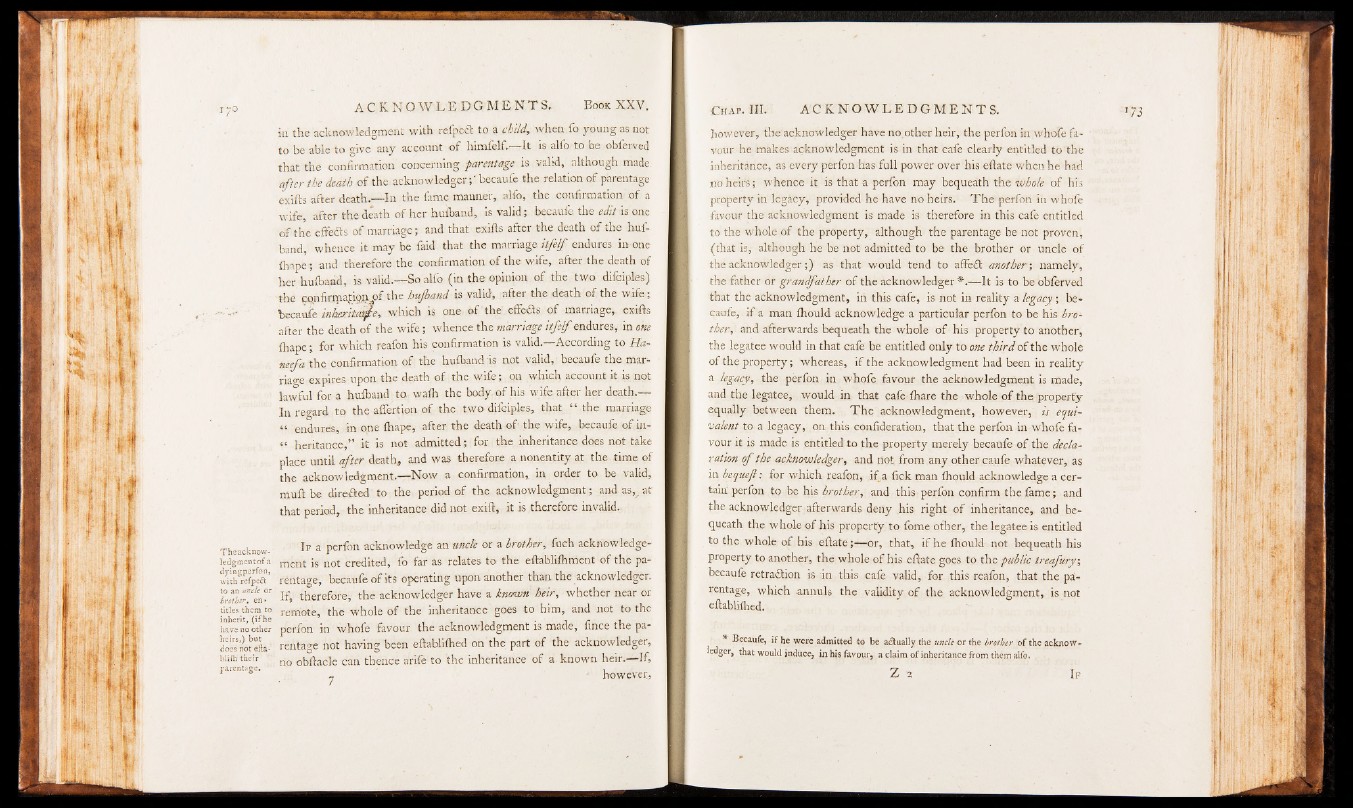
The acknowledgment
of a
dyingperfon,
with refpeft
to an uncle or
brother, en*
titles them to
inherit, ( if he
have no other
heirs,) but
does not efta- blifh their ' parentage.
in the acknowledgment with refpe<ft to a child, when fo young as not
to be able to give any account of himfelf..— It is alfo to be obferved
that the confirmation concerning parentage is valid, although, made.
after the death of the acknowledger;'becaufe the relation of parentage
exifts after death.— In the lame manner,, alfo, the confirmation of a
wife, after the death of her huiband, is valid.; becaule the edit is one
of the effeas of marriage ; and that exifts after the death of the half-
band, whence it may be faid that the marriage k fe lf endures in one
Ihape; and therefore the confirmation of the wife, after the death of
her huiband, is. valid.— So alfo (in the opinion of the two difciples)
the cpnfirmafipn of the hujband is valid, aftei the death of the wife ;,
becaule inheritable', which is one of the effects of marriage, exifts
after the death of the wife ; whence the marriage itfe lf endures, in one
fhape ; for which reafon his, confirmation is valid.—According to Ha-
neefa the confirmation of; the huiband is not valid, - becaufe the mar^-
riao-e expires upon the death of the wife; on which account it is not
lawful for a huiband to.: wafh the body, of his wife after her death.—
In regard to the affertion of the two difciples, that “ the marriage
“ endures, in one Ihape, after the death of-the wife, becaule of in-
■ heritance,” it is not admitted; for the inheritance does not take
place until after death, and was therefore a nonentity at the time of
the acknowledgment.— Now a confirmation, in order to be valid,
muft be directed to the period of the acknowledgment; and as,_ at
that period, the inheritance did not exift, it is therefore invalid.
If a perfon acknowledge an uncle or a brother, fuch acknowledgement
is not credited, fo far as. relates to the eftabliftiment of the pa*
rentage, becaule of its operating upon another than the acknowledger.
If, therefore, the acknowledger have a known heir, whether near or
remote, the whole of the inheritance goes to him, and not to the
perfon in whofe favour the acknowledgment is made, fince the parentage
not having been eftablilhed on the part of the acknowledger,
no obftaele can thence arife to the inheritance of a known heir.— Jr,
. - - however,
however, the acknowledger have no.other heir, the perfon in whole favour
he makes acknowledgment is in that cafe clearly entitled to the
inheritance, as every perfon has full power over his eftate when he had
no heirs; whence it is that a perfon may bequeath the whole of his
property in legacy, provided he have no heirs. T h e perfon in whofe
favour the acknowledgment is made is therefore in this cafe entitled
to the whole of the property, although the parentage be not proven,
(that is* although he be not admitted to be the brother or uncle of
the acknowledger ;) as that would tend to affedt another ; namely,
the father or grandfather of the acknowledger * .— It is to be oblerved
that the acknowledgment, in this cafe, is not in reality a legacy ; becaufe,
if a man Ihould acknowledge a particular perfon to be his brother,
and afterwards bequeath the whole of his property to another,
the legatee would in that cafe be entitled only to one third of the whole
of the property ; whereas, if the acknowledgment had been in reality
a legacy, the perfon in whofe favour the acknowledgment is made,
and the legatee, would in that cafe Ihare the whole of the property
equally between them. T h e acknowledgment, however, is equivalent
to a legacy, on this confederation, that the perfon in whofe favour
it is made is entitled to the property merely becaufe of the declaration
o f the acknowledger, and riot from any other caufe whatever, as
in bequefl : for which reafon, i f a fick man Ihould acknowledge a certain'
perfon to be his brother, and this perfon confirm the lame; and
the acknowledger afterwards deny his right of inheritance, and bequeath
the whole of his property to fome other, the legatee is entitled
to the whole of his eftate;— or, that, if he Ihould not bequeath his
property to another, the whole of his eftate goes to the public treafury,
becaufe retradlion is in this cafe valid, for this reafon, that the parentage,
which annuls the validity of the acknowledgment, is not
eftablilhed.
* Becaufe, if he were admitted to be actually the unde or the brother of the acknow-
edger, that would induce, in his favour, a claim of inheritance from them alfo.
Z 2 I f